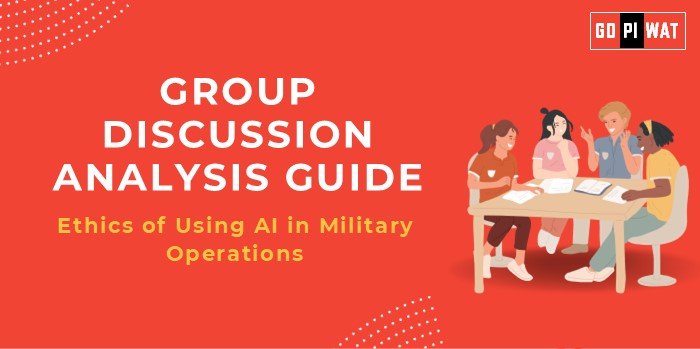📋 Group Discussion Analysis Guide: Ethics of Using AI in Military Operations
🌐 Introduction to the Topic
Context Setting: Artificial Intelligence (AI) is transforming military strategies globally, introducing ethical dilemmas related to decision-making, accountability, and the morality of autonomous systems in warfare.
Background: The integration of AI into military operations began with predictive analytics and expanded to autonomous drones, surveillance systems, and decision-making algorithms. AI’s potential to minimize human casualties contrasts with concerns about loss of control and unintended consequences.
📊 Quick Facts and Key Statistics
- 💵 Global Military AI Spending: $9 billion (2023) – Demonstrates the growing reliance on AI in defense budgets.
- ✈️ AI-Powered Drones: Over 90 countries have deployed drones, with some integrating AI for autonomous strikes.
- ⚠️ Civilian Casualties from Autonomous Systems: Rising global concerns as AI lacks moral reasoning.
- 🌍 UN Concerns: The UN has warned against “killer robots” for their ethical implications and calls for regulation.
🤝 Stakeholders and Their Roles
- 🏛️ Governments: Develop military AI policies and fund research (e.g., U.S. Pentagon, China’s AI program).
- 💻 Technology Companies: Build AI systems and tools for surveillance, targeting, and operations.
- 🌐 International Organizations: Push for ethical regulations and laws, like UN initiatives against lethal autonomous weapons.
- 👥 Citizens and Activists: Advocate for ethical AI use and transparency in military AI deployment.
🏆 Achievements and Challenges
✨ Achievements
- ⚡ Enhanced Decision-Making: AI-enabled systems like predictive analytics help military planners identify threats faster.
- 🛡️ Reduced Soldier Casualties: AI-operated robots reduce risks to human soldiers in high-risk operations.
- 🔍 Improved Surveillance: AI helps process vast amounts of data for intelligence, improving situational awareness.
⚠️ Challenges
- ⚖️ Ethical Dilemmas: Concerns over moral accountability for AI-led attacks.
- 💣 Risk of Misuse: Autonomous weapons in rogue states or terrorist hands.
- 📜 Global Regulations: Lack of consensus on regulating military AI tools like lethal autonomous weapons.
🌍 Global Comparisons
U.S. vs. China: The U.S. prioritizes ethical research, while China focuses on rapid AI deployment.
Israel’s Use of AI Drones: Demonstrates operational success but raises ethical red flags internationally.
📄 Structured Arguments for Discussion
- ✅ Supporting Stance: “AI minimizes human casualties by enabling precise targeting in warfare.”
- ❌ Opposing Stance: “AI’s lack of moral judgment makes it unsuitable for autonomous military operations.”
- ⚖️ Balanced Perspective: “While AI can save lives, strict ethical guidelines and oversight are necessary for its use in warfare.”
🎯 Effective Discussion Approaches
- Opening Approaches:
- 🗣️ Quote-Based: “Stephen Hawking once warned that AI could be the end of humanity—how does this apply to its use in military operations?”
- 📊 Statistical Opener: “With $9 billion spent annually, military AI is reshaping warfare globally. Should ethics catch up?”
- 📚 Case Study: “The 2020 Nagorno-Karabakh conflict highlighted AI drones’ decisive yet controversial role.”
- Counter-Argument Handling:
- ✅ Response to Lack of Emotional Reasoning: “Human errors in warfare often stem from emotional decisions, which AI avoids.”
- 🔧 Response to Malfunction Risks: “Improved testing and safeguards can mitigate such risks.”
📊 Strategic Analysis of Strengths and Weaknesses
- 💪 Strengths: Enhances operational efficiency, reduces human risk in hazardous zones, offers predictive intelligence for better planning.
- 📉 Weaknesses: Ethical concerns over decision-making accountability, high cost, and potential misuse.
- 🚀 Opportunities: AI as a deterrence strategy, international collaborations for ethical AI deployment.
- ⚡ Threats: Weaponization by non-state actors, escalation of autonomous weapon arms races.
📈 Connecting with B-School Applications
- 🌐 Real-World Applications: Relevant to debates on ethics, technology policy, and global security strategy.
- 🗣️ Sample Interview Questions:
- 💬 “How do you balance technological advancement with ethical considerations in military AI?”
- ⚖️ “What lessons can businesses learn from military AI deployment?”
- 🎓 Insights for Students:
- Ethics in technology is a growing field for projects or internships.
- Global geopolitics impacts AI innovation and policies.


